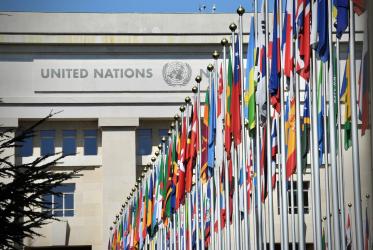All forms of human enslavement are the most heinous of sins, violating the free will and the integrity of every human being created in the image of God, stated the Forum on Modern Slavery, co-organized by the Ecumenical Patriarchate and the Church of England in Istanbul from February 6-7, 2017.
With the title “Sins Before Our Eyes”, forum commended the efforts of the international community and endorsed the United Nations Protocol to Prevent, Suppress and Punish Trafficking in Persons, especially Women and Children.
The aim of the gathering was to bring together distinguished scholars, practitioners, and policymakers from around the world to discuss modern slavery and emphasize the protection of human dignity and freedom as of vital importance for the Church as well as worldwide religious and human-rights communities.
During the forum Ecumenical Patriarch Bartholomew and Archbishop of Canterbury Justin Welby signed a Joint Declaration, urging the faithful and church communities, as well as all people of good will “to become educated, raise awareness, and take action with regard to these tragedies of modern slavery, and to commit themselves to working and praying actively towards the eradication of this scourge against humanity”. They also encouraged state leaders to find appropriate and effective ways of prosecuting those involved in human trafficking, preventing all forms of modern-day slavery, and protecting its victims in our communities and promoting hope wherever people are exploited.
In his keynote address, His All-Holiness Ecumenical Patriarch Bartholomew said: “Whatever the Church says, whatever the Church does, is done in the Name of God and for the sake of human dignity and the eternal destiny of the human being. It is impossible for the Church to close its eyes to evil, to be indifferent to the cry of the needy, oppressed and exploited. True faith is a source of permanent struggle against the powers of inhumanity.”
Slavery is more rampant today than any other time in human history, noted Archbishop Welby, calling it an “abomination to human dignity”.
“There is no religious basis or justification for a practice that commodifies human beings,” he said. “All religious leaders need to speak out against such a practice and challenge those false prophets that seek to corrupt sacred texts to justify their warped behaviour.”
Last year, the number of displaced people exceeded 60 million – and human smuggling too easily can turn into human trafficking, added Archbishop Welby. The scale of today's migration has become a natural feeding ground for slave masters and human traffickers. “Migrants on the move are being approached by strangers with offers of work or marriage. Some are being offered money for organs and body parts. It is heart wrenching to think that thousands that escaped the horrors of Daesh have had their hopes for a better future wrecked on Europe's shores by the evil intentions of those that profit from such an odious trade.”
As many as 10,000 children registered as refugees are now unaccounted for, with 5,000 missing in Italy and 1,000 in Sweden. “This is an unacceptable and shameful state of affairs which governments and relevant UN bodies must respond to as a matter of urgency”, stated Archbishop Welby.
The World Council of Churches was represented at the gathering by Dr Katalina Tahaafe-Williams, WCC programme executive for Mission and Evangelism and Dr Fulata Lusungu Moyo, WCC programme executive for the Just Community of Women and Men.
“This is a very crucial issue that needs to be addressed urgently and the churches must make a strong response to it - in fact all religions must bring a strong and unified response in statements and action”, reflecting on the forum said Dr Katalina Tahaafe-Williams. “The WCC is joining in this concerted effort by the Ecumenical Patriarchate and the Archbishop of Canterbury to high-profile modern slavery as a sin that we all must combat.”
According to the estimates by the International Labour Organisation and Global Slavery Index presented during the forum, there are between 20 and 45 million people in the world under one or another form of slavery, and a significant number of them are women and children subjected to sexual exploitation.
“Slavery is a sin against humanity, and human trafficking turn human beings created in the image of God into commodities for sexual exploitation, cheap labour and organ extraction”, said Dr Fulata Lusungu Moyo, adding that it was crucially important to rise a united church voice that it is actually wrong. At the same time the forum was giving hope “that joint declaration signed is not just words, but commitment to action to end slavery”.
This forum ended with planting the seed for churches working together against the dehumanization - the Ecumenical Patriarch and the Archbishop of Canterbury established a joint taskforce for combatting the modern slavery.
Modern Slavery - A Joint Declaration
Archbishop of Canterbury's speech at Istanbul forum on modern slavery








